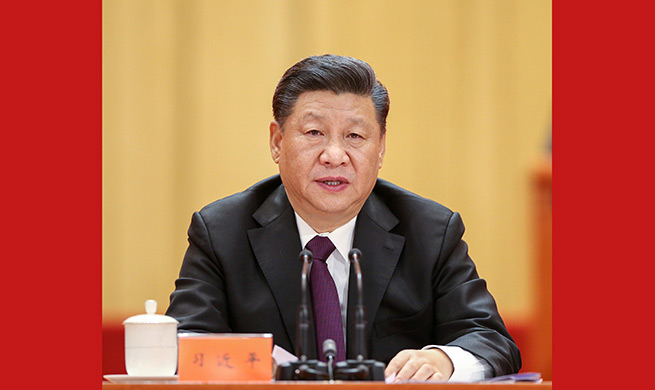ROME, Dec. 19 (Xinhua) -- Italy's two-month-old budget standoff with the European Commission ended Wednesday after commissioners said the Italian government's most recent set of cutbacks were enough for Italy to avoid looming economic sanctions.
Now, analysts told Xinhua, the government's challenge is to make the budget plan that includes 7 billion euros (8 billion U.S. dollars) less than it originally planned deliver on an ambitious set of promises.
"Both sides had to compromise to get to this point, and both will have to manage, "Giandomenico Piluso, an associate professor of economic history at the University of Siena, said in an interview.
"The Italian government realized it cannot stand up to the European Commission to the extent it planned to," Piluso went on. "At the same time, commissioners understood that given the political climate across Europe they have to allow for more flexibility."
Piluso was referring to the rise of populist movements like the one behind the government of Giuseppe Conte, who has been prime minister since June. The Conte government was formed with the support of the anti-establishment Five-Star Movement and the nationalist League.
Similar movements are behind Brexit, the plan for Britons to exit the European Union next year, as well as the current unrest in France, where President Emmanuel Macron has been forced to ramp up government spending in order to stay in power.
In Italy, the government in October unveiled a budget plan that would have featured a deficit equal to 2.4 percent of the country's gross domestic product. That was far higher than the 0.8-percent-of-gross-domestic-product deficit guidance issued by commissioners earlier in the year.
The commission, which is the executive branch of the European Union, refused to accept the plan, sending the Conte government back to the drawing board several times. At first, Italy refused to budge, which opened the door to the possibility of sanctions totaling as much as 0.2 percent of the country's gross domestic product.
On Wednesday, that was avoided when commissioners said they would accept a compromise budget plan with a deficit equal to 2.04 percent of Italy's gross domestic product next year, based on government projections.
"This budget is a holiday gift for the Italian government," Francesco Daveri, a program director and economist with Bocconi University in Milan, told Xinhua. "It avoided a clash that would have been bad for both sides, but especially bad for Italy."
Government officials vowed this week that even with the budget cutbacks, the two main planks of the Conte government -- a more generous pension program and a minimum basic income for poor Italians -- would remain. In order to meet the lower deficit targets, both initiatives were cut by around 2 billion euros (2.3 billion U.S. dollars).
"The government agreed to spend less on the two main programs but it was vague about how they will work with those cutbacks," Daveri said. "Now comes the hard part: how to make things work as they promised, like sparking more economic growth, but with less money than they planned on having."
Daveri concluded: "It has been a difficult process up to now, but what comes next is the hard part," he said.
Italian law requires parliamentary approval of the budget plan no later than Dec. 23. That is now considered likely, with the backing of lawmakers from the Five-Star Movement and the League.













